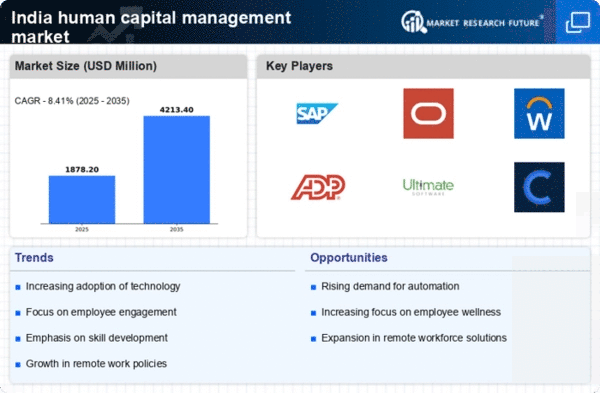Rise of Remote Work Culture
The human capital-management market in India is witnessing a transformation due to the rise of remote work culture. As organizations embrace flexible work arrangements, there is a growing need for effective management of remote teams. This shift is prompting companies to invest in human capital-management solutions that facilitate communication, performance tracking, and employee engagement in a virtual environment. Data suggests that organizations implementing remote work policies have reported a 20% increase in employee satisfaction. Consequently, the demand for tools that support remote workforce management is likely to grow, reshaping the landscape of human capital-management in India.
Focus on Employee Well-being
The human capital-management market in India is increasingly prioritizing employee well-being as a core component of organizational strategy. Companies are recognizing that a healthy workforce is essential for productivity and retention. Initiatives aimed at mental health support, work-life balance, and wellness programs are becoming integral to human capital-management practices. Research indicates that organizations investing in employee well-being programs can experience a 25% reduction in turnover rates. This trend is likely to drive the development of human capital-management solutions that incorporate well-being metrics and support systems, reflecting a holistic approach to talent management.
Growing Demand for Skilled Workforce
The human capital-management market in India is experiencing a notable surge in demand for skilled professionals. As industries evolve, the need for specialized skills becomes increasingly critical. Reports indicate that by 2025, approximately 60% of employers in India are expected to prioritize hiring candidates with advanced technical skills. This shift is likely to drive investments in training and development programs, thereby enhancing the overall talent pool. Companies are recognizing that a skilled workforce is essential for maintaining competitiveness in a rapidly changing market. Consequently, organizations are investing in human capital-management solutions that facilitate effective recruitment, training, and retention strategies, ensuring they attract and retain top talent.
Regulatory Compliance and Labor Laws
The human capital-management market in India is significantly influenced by the evolving landscape of labor laws and regulatory compliance. Recent reforms have introduced new requirements for employee benefits, workplace safety, and fair labor practices. Organizations are compelled to adapt their human capital-management strategies to ensure compliance with these regulations. This necessity is driving the adoption of sophisticated human capital-management systems that streamline compliance processes and reduce the risk of legal penalties. It is estimated that companies investing in compliance-focused human capital-management solutions could see a reduction in legal costs by up to 30%. As such, the market is likely to expand as businesses seek to navigate these complexities.
Technological Advancements in HR Processes
The human capital-management market in India is being propelled by rapid technological advancements that enhance HR processes. Innovations such as artificial intelligence, machine learning, and data analytics are transforming how organizations manage their workforce. These technologies enable more efficient recruitment, performance evaluation, and employee engagement strategies. It is projected that by 2026, the adoption of AI-driven human capital-management solutions could increase operational efficiency by up to 40%. As businesses seek to leverage technology for better decision-making and streamlined processes, the demand for advanced human capital-management systems is expected to rise, shaping the future of workforce management in India.
















